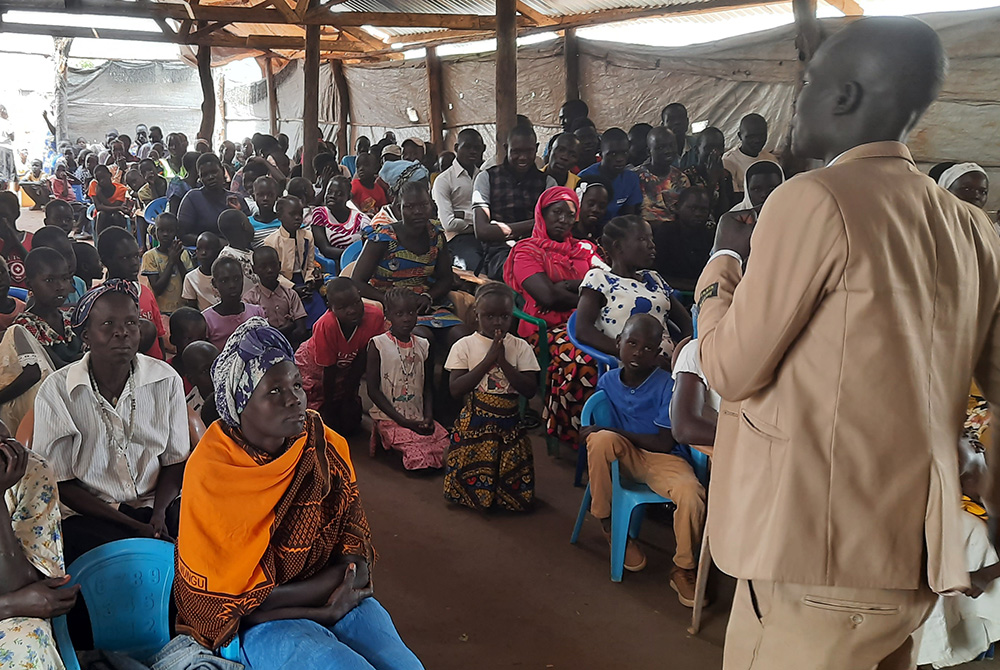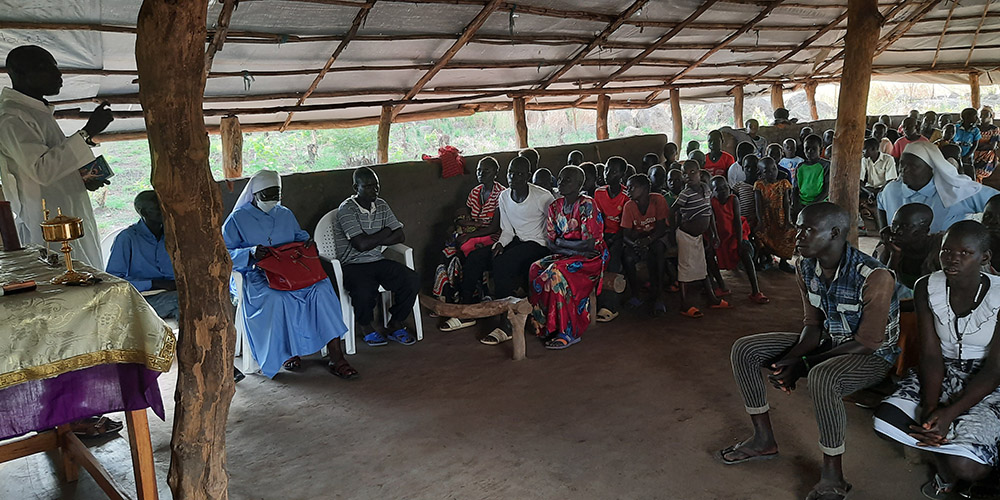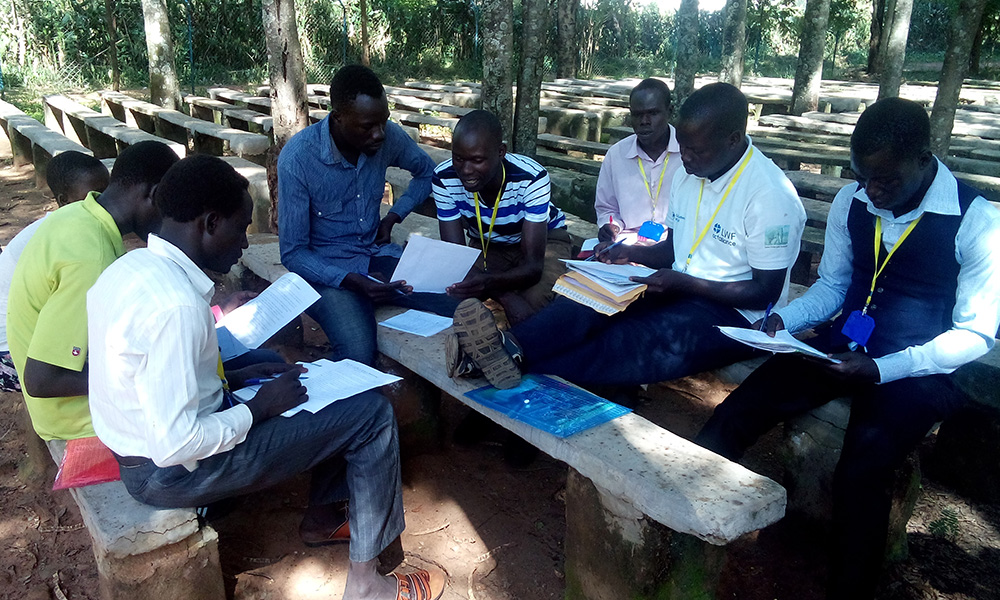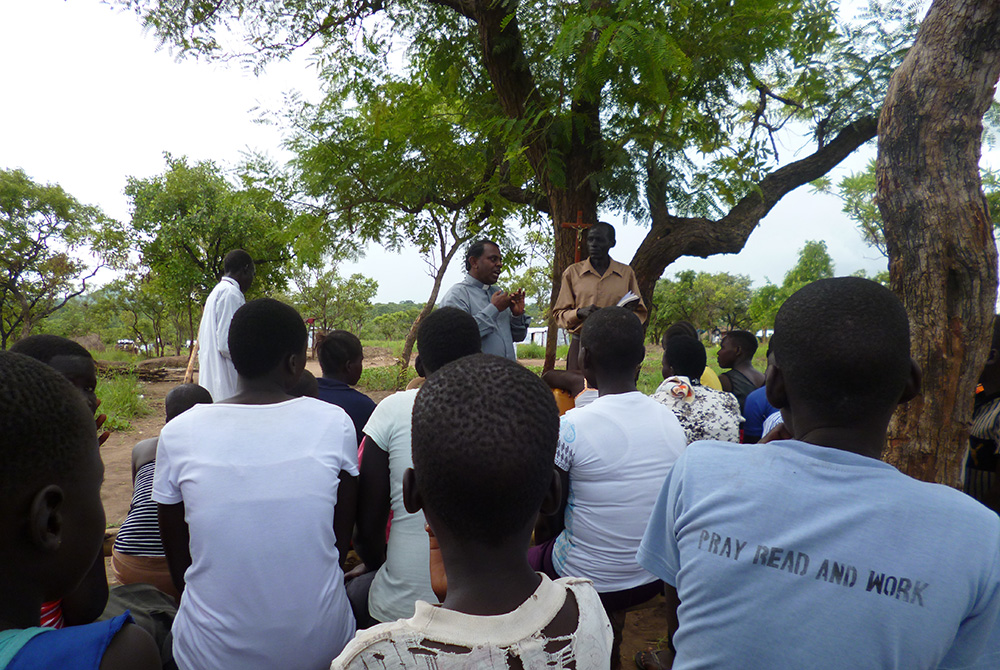
Oola Bosco, a catechist, teaches at the Palabek Refugee Settlement March 2021 in Uganda. Many of the refugees at the settlement are from South Sudan. (Courtesy of Lazar Arasu)
In his apostolic letter this May creating the new ministry of catechist for the Catholic Church, Pope Francis said he wanted to recognize those who teach the faith as having a "stable form of service rendered to the local Church."
In Uganda, catechists have offered our local Catholic Church a great service. Many meet the pastoral needs of our people as we face a shortage of priests, offering liturgical assistance in our remote rural parishes. Others have even given their lives in defense of the faith.
Catechists help sustain people's faith when priests are able to visit village chapels only once every three or four months. They offer pastoral assistance by preparing people for the sacraments, visiting the sick, officiating at funeral services and by doing many more services which are normally done by ordained ministers.

Mwaka Charles, a catechist, leads an Easter service in the absence of a priest in April 2021. (Courtesy of Lazar Arasu)
Moses Kiggwa is a dedicated catechist in Kamuli parish within Jinja Diocese, which is about 70 miles east of our capital of Kampala. Besides training as a primary teacher, he also trained himself as a catechist.
"I find joy in being a catechist more than anything else," Moses told me recently. He eventually gave up his teaching career to be a full-time evangelizer. He noted with pride that he has helped to found several sub-parishes in the remote areas of his parish, along the Nile River.
Now in his late 50s, he is still committed to educating people to faith. Riding his bicycle for several years in his evangelization efforts has created serious health problems, but he is only happy that he has sustained the faith of several hundreds of people.
Paul Kasoma is a seasoned catechist in the Kasana-Luweero Diocese, which is about 25 miles north of Kampala. As a little boy he used to accompany his grandfather, who was a catechist trained by the Missionaries of Africa, commonly called the White Fathers.
Paul vowed to take up his grandfather's mantle. When his grandfather retired as catechist, the grandson, who was only then 19 years old, was accepted by his community as a true heir and became their catechist. Now Paul vows to recruit young catechists who can take up responsibilities in the church just as he has done.

Catechists from the Palabek Refugee Settlement lead training for a small Christian community in August 2019. (Courtesy of Lazar Arasu)
Urban migration brought Faith Alyeru to Luweero, which is also in the Kasana-Luweero Diocese. As Faith got used to a new urban setting she also got interested in the activities of the Catholic mission. Faith found joy in interacting with the children of the local Christian community that taught her their native tribal language and shared with her much-needed friendship.
With her inborn leadership skills, she became a youth leader and eventually a catechist. Though she does not belong to the local tribe, she feels at home when teaching catechism, preaching and visiting peoples' homes. As an expert in handicrafts, besides the Christian faith she also shares with her flock life skills that can help them in earning income.
The Second Vatican Council's decree on missionary activity, Ad Gentes, praised the work of catechists as an "outstanding and altogether necessary contribution to the spread of the Faith and the Church." Thus, the bishops at the council highlighted the indispensable activities of catechists in the missionary churches.
In his May apostolic letter, titled Antiquum Ministerium ("Ancient Ministry"), Francis gave tribute to how some catechists have become martyrs of the faith, citing "men and women of deep faith, authentic witnesses of holiness, who in some cases were also founders of Churches and eventually died as martyrs."
This reminds us of the life of the Catholic martyrs killed by King Mwanga II, including Charles Lwanga, Mattias Mulumba Kalemba and Noe Mawaggali; and other blessed martyrs of northern Uganda like Jildo Irwa and Daudi Okelo.
In my ministry, I work with the some 50,000 refugees and local people in Palabek, on Uganda's border with South Sudan. It is impossible for me to reach to all of them if not for the 25 catechists who are my pastoral agents. They also help me to understand pastoral situations in an enlightened way.

A catechist assists Salesian Fr. Lazar Arasu in preparing young people for First Holy Communion in 2019. (Courtesy of Lazar Arasu)
They are truly living in the world; they share the life challenges much more than the priests who live in presbyteries that are removed from the "ordinariness" of life. They are the face of the church to ordinary Christians.
But because of the minimum formation given to them, they often feel inadequate. Paul told me that while priests have undergone several years of seminary preparation, many catechists have not gone through even three months of training, but people expect them to preach in the same way as the priests.
In his apostolic letter, Francis said catechists should receive "suitable biblical, theological, pastoral and pedagogical formation to be competent communicators of the truth of the faith and they should have some prior experience of catechesis."
Advertisement
Catechists' formation should also give them training in combining their personal life of witness to the service they offer. People expect catechists and their family members to live as they serve. They are also expected to be exemplary in social and economic aspects of life.
Catechists often offer several hours of service to the community each week and are not paid for it. The church also has to find a way of uplifting their lives with livelihood opportunities.
I hope and pray that the bishops' conference in Uganda and others in Africa take advantage of the pope's creation of the catechist ministry and take steps to train, institute and make good use of catechists in our missionary churches.
[Salesian Fr. Lazar Arasu serves with Don Bosco Refugee Services in Palabek, Uganda.]







